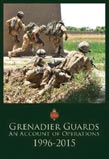|
Grenadier Guards: An Account of Operations 1996-2015
Edited and Compiled by Alan Ogden
|
 Great Regiments, like great buildings, embody a powerful sense of shared identity. Great Regiments, like great buildings, embody a powerful sense of shared identity.
They also serve to inspire as well as to comfort in difficult times. The back cover of this excellent operational account of a challenging era in the Grenadiers’ illustrious history records Lance Corporal James Ashworth’s inspirational gallantry in Helmand Province in 2012 where he was to win the Regiment’s 14th Victoria Cross. Under the patronage of HRH The Prince Philip, The Colonel’s Fund raised £3m to look after the families of Grenadiers killed in action, and to care for those wounded in mind or body.
Writing any form of Regimental history is a daunting task. A biography looks at the life of one person; the history of a Regiment looks at the lives and actions of many individuals whose ‘take’ on events during their period of service is likely to be coloured by their own personal experience. Rudyard Kipling’s unsurpassed masterpiece, The Irish Guards in the Great War describes in Kipling’s own words, ‘soberly and with what truth is possible the experiences of the Regiment’. Alan Ogden, a former Grenadier and the Regiment’s current archivist, describes this account, ‘As a record, to capture with fidelity the breadth and complexity of Operations carried out by the Grenadiers 1996- 2015’. It is to Alan’s great credit, and to the readers’ pleasure, that he avoids merely recording the formulaic templates required today by the MOD’s Historical Branch in regimental war diaries. His time spent talking to the commanders during this period is invaluable.
Alan covers an unusually searching and complex period for the Regiment from Northern Ireland to Kosovo and Bosnia, to Iraq and Afghanistan where the Regiment completed three tours. In the Balkans, Grenadiers may not have had to endure the kinetic ferocity of Afghanistan, but they were to witness atrocities which were to eat into any man’s soul. Lieutenant Colonel Piers Ashfield DSO, then The Queen’s Company Second Captain: ‘We arrived in Kosovo Polje to find a number of Serbs had been burnt alive in the drainage ditches in front of their homes’. Major Hancock: ‘The biggest challenge we faced was our Grenadier approach versus the Dutch approach who felt they were purely to make friends’. The Dutch were doubtless still traumatized by the events that had led to the massacre of 8000 Bosnians at Srebrenica. It makes for sober reading and a testament to the Regiment’s discipline.
The account of the Grenadiers in Northern Ireland, a campaign which, lest we forget, resulted in more soldiers killed and wounded than the Falklands, Iraq and Afghanistan put together, will resonate strongly with those Grenadiers who completed one or more of the 17 tours 1969-2001. Once again, it’s a story of endurance, discipline and frustration. Captain Carew Hatherley, later to command the Grenadier Guards in Afghanistan, ‘We arrested Seamus McArdle, a member of the PIRA sniper team in South Armagh and convicted of the 1996 Canary Wharf bombing. He was sentenced to 25 years but released under the terms of The Good Friday Agreement.’
Iraq and Afghanistan, in the now infamous words of Donald Rumsfeld, US Secretary of Defense, ‘There are unknown unknowns, the ones we don’t know we don’t know’ was for the Regiment, as for the whole British army, an era of political incompetence, failures of higher command, witness Basra, and unremitting sacrifice by the British soldier. Alan paints the history of Afghanistan and our previous involvement there (1839-42, 1878-80, and 1919) supremely well. The Grenadiers completed three operational tours, Operation Herrick VI, XI and XVI. For those aficionados of topography, ORBATS, arsenals, deployments at battlegroup and company level, and operational awards, there is a wealth of thoughtful detail. More poignantly, there are details of those killed and wounded in action and how and when these sorrowful events took place.
Alan’s account of Operation Herrick XI is particularly good. The Grenadiers area of operations was Nad-e Ali, the most lethal place in Afghanistan. The Commanding Officer, Lt Col Roly Walker DSO, now a major general, provides a compelling narrative to a tour, as heavy in achievement as in sacrifice, resulting in five Grenadiers dead including the much respected RSM Darren Chant: ‘We had to live in a world where you were being spied on the whole time, insurgent scouts were selling water outside the back gate’.
The final reconciliation for Operation Herrick was a heavy one: 19 Grenadiers, including those attached from other regiments and arms, killed in action. Those badly wounded in mind and body significantly more. It is of comfort that the Regiment’s bravery and fortitude was recognised in one VC, two DSOs, 4 MCs, 16 Mention in Dispatches, 5 QCVSs, one OBE and one Commendation for Bravery.
The book’s layout is unusual in that the use of bubbles containing quotes such as ‘We may be fighting the wrong war in the wrong country’ from politicians, journalists and senior commanders, can serve to draw the eye away from a powerful narrative; on the other hand, they effectively illustrate the non-stop dissonant media noise that characterized these conflicts.
It’s probably a little ‘unguardsmanlike’, but I would have liked to have seen a photograph and a small ‘hurrah’ for the Regiment’s Colonel during this period, HRH The Prince Philip, whose personal example and interest in the Regiment was inspirational.
As the senior Regiment of infantry in the British Army, it has its obligations to past, present and future Grenadiers, and to the British Army as a whole. It’s quite a name to live up to. The Regiment will celebrate its quatercentenary in 2060. Alan Ogden has done his former Regiment proud.
Paul de Zulueta
Published by Nine Elm Books |
|